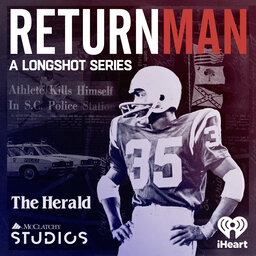


Longshot: Return Man
Playlist by Longshot: Return ManSeason 1 of Longshot: Return Man is an investigation into the life and mysterious death of the only Super Bowl champion from Lancaster, S.C. In 1970, Jim Duncan was a star on the rise for the Baltimor…Follow the podcast:
11 clip(s) in playlist

Part 5: The Police Station
According to officials, Jim Duncan walked into the Lancaster Police Station on Oct. 20, 1972, and crossed the lobby in just a few steps. Without saying a word, authorities allege, he ripped the revolver from the holster on an unsuspecting officer's hip, stepped back, and shot himself in the head. B…
33:51
Part 4: October 20, 1972
After a series of injuries and bizarre behavior, Jim Duncan's last chance to catch on with a new NFL team fell short. By the fall of 1972, he was back in Lancaster; his career was over, his marriage wasn't much better off, and he was running out of money. On the morning of Oct. 20, 1972, Duncan lef…
29:53
Bonus 1: Seth Stoughton
Seth Stoughton, whom listeners heard in the podcast, was a police officer before becoming a lawyer. Today, he teaches at the University of South Carolina School of Law, and is an expert in the evolution of policing tactics throughout American history. In this extended interview, Stoughton talks abo…
31:46
Part 8: Speaking from the Grave
For some, including some of Jim Duncan's friends, the past is better left in the past. But for others, there could never be closure with so many open questions; and the chance to find answers is worth the pain of asking one last time. Late in our reporting, we learned that a legal team in New York …
33:18
Part 1: The Milltown
Jim Duncan was one of eight children, growing up in a shotgun house on the poorest side of a small South Carolina milltown. There in Lancaster, the public facilities were segregated—but one of the few spots Blacks and whites both called home was the lone football field in town, shared by the Black …
28:31
Part 3: The Burden
Following his Super Bowl win, Jim Duncan fell in love with a woman he met in South Carolina. But financial obligations soon sapped his joy for the game, and those who knew Jim say his personality began changing in unsettling ways. They speculate that for a rising star playing arguably the most dang…
23:39
Bonus 2: Paula Johnson
Paula Johnson, whom listeners heard in the podcast, is a professor at the Syracuse University College of Law, and co-director of the Cold Case Justice Initiative (CCJI). Her team at CCJI could soon begin investigating Jim Duncan's death from a legal perspective. In this extended interview, Johnson …
20:48
Part 2: From the Cotton Fields to Glory
Jim Duncan's rare athleticism made him a star on the Maryland State College football team, where he played offense, defense and special teams. In 1968, he was a fourth-round draft pick by the Baltimore Colts, and soon became the leading kickoff return man in the NFL, enjoying a level of celebrity a…
26:49
Part 7: Conspiracy
In the weeks following Jim Duncan's death, conspiracy theories proliferated throughout the Black community in Lancaster. Was his death really about drugs? A woman? His skin color? Many other proposed versions of events seemed equally as implausible as the official narrative—but one scandalous theor…
28:05
Part 6: The Inquest
Following Jim Duncan's death, the Lancaster County coroner called an inquest to determine what happened inside the police station. Seven witnesses were called to testify under oath; all worked at, or with, the Lancaster police department. After a short deliberation, the small jury concluded that Du…
27:57
 Longshot: Return Man
Longshot: Return Man